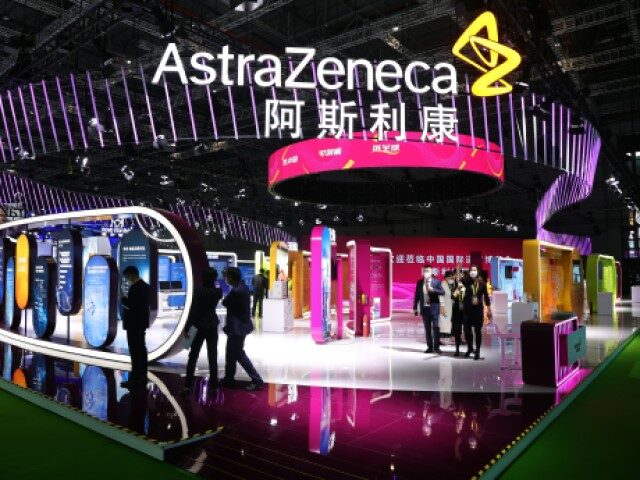Wang Lei, global executive vice president for British-Swedish pharmaceutical giant AstraZeneca and president of its decades-old branch in China, said on Friday that the company “loves the Communist Party” and will strive to express its patriotic affection for the tyrannical regime in Beijing.
Other AstraZeneca executives refused to comment on these astonishing remarks or confirm if Wang was expressing the company’s true posture toward China.
As Reuters pointed out, there was little chance that Wang simply “misspoke” – as corporate public relations teams often suggest – because everything he said was broadcast on a big screen behind him while he addressed a 30th-anniversary gala for AstraZeneca in China:
“Build a local, transnational company that loves the Communist Party and loves the country,” Wang said in his presentation to an audience of a few hundred participants. Photographs showed the words flashing across a screen behind him.
In response to questions from Reuters on whether Wang’s pledge, and the contents of the presentation, were approved by AstraZeneca’s senior management, a spokesperson at the company’s headquarters in Cambridge declined to comment.
The spokesperson also declined to comment on what Wang’s comments meant for its business plans in China.
Reuters charitably noted that other foreign companies like Apple have spoken up to “stress their commitment” to China after that wondrous land of cheap labor and negligible environmental protections emerged from years of destructive coronavirus lockdowns. China’s recently-installed Premier Li Qiang has been spearheading an effort to reassure nervous international corporations that Beijing won’t shut down their factories again.
The Communist Party is also keenly aware that many foreign companies are diversifying their supply chains to become less reliant upon China, turning to alternatives such as India and Vietnam. It would not be surprising if Chinese Communist Party commissars are using their economic leverage to extract statements of confidence and loyalty from foreign businesses, in exchange for retaining their access to both factories and the consumer market in China.
AstraZeneca relies on China for 13 percent of its sales and last month committed $450 million to build a new factory for producing inhalers in Qingdao – a potentially hot item for Chinese consumers, as so many of them suffer from smoking and air pollution. Reuters noted the company needs big sales from other products to make up for declining revenue from its coronavirus vaccine.
Also in the mix is China’s increasingly troubling crackdown on foreign businesses, which on Friday prompted a U.S.-based consulting firm called the Mintz Group to pull much of its staff out of Hong Kong for their safety.
The Mintz Group was one of several consulting and due diligence firms raided by the Chinese regime this year for unclear reasons, a crackdown seemingly inconsistent with Premier Li Qiang’s efforts to lure overseas companies back. Mintz employees reportedly believe they were targeted because the company has studied supply chains that might have been tainted by forced labor from the oppressed Uyghur Muslims.
On Thursday, dictator Xi Jinping signaled the crackdown on foreign corporations will not be slowing down any time soon by putting Minister of State Security Chen Yixin in charge. Chen ran a campaign to “purge corrupt security and legal officials” before he was named Minister of State Security in October.
The Wall Street Journal (WSJ) reported the announcement was unsettling to international CEOs who expected Xi to send out friendly technocratic officials to reassure them after beating up a few companies that stuck their noses too deeply into the Uyghur genocide. Instead, the crackdown is broadening and intensifying, with Beijing’s spymaster in command.
Companies that still desire access to Chinese markets might believe a show of affection and loyalty to the Communist Party is the best way to demonstrate they are not a threat and have no intention of embarrassing the regime by asking questions about the Uyghurs, Tibet, the Wuhan coronavirus, or other sensitive subjects.

COMMENTS
Please let us know if you're having issues with commenting.